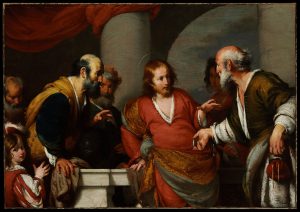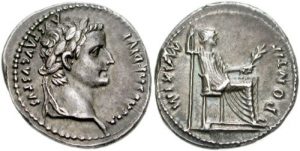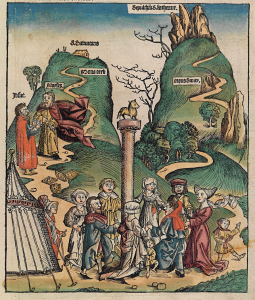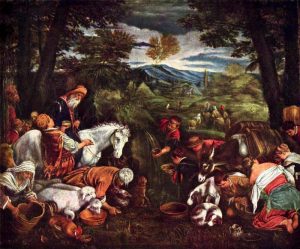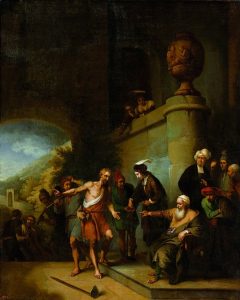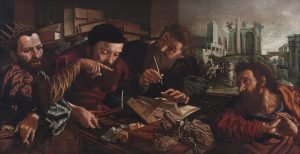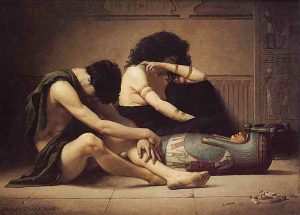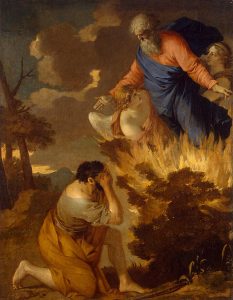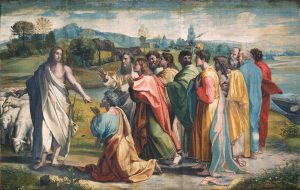Thoughts on Sunday’s Lessons for Oct. 25, 2020
First Reading (Track One): Deuteronomy 34:1-12
Moses dies, and Joshua takes command. Jesus tells the Pharisees about the greatest commandment. There is plenty to inspire our imagination in Sunday’s Lectionary readings.
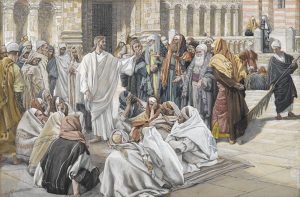
The Pharisees Question Jesus (1886-1894), medium gouache over graphite on gray wove paper by James Tissot (1836-1902). Brooklyn Museum. (Click image to enlarge.)
The Track One first reading concludes the Torah, the first five books of the First Testament, the Law. Moses has led the progeny of Abraham, Isaac, Jacob and Joseph out of slavery in Egypt, received God’s commandments and made God’s covenant at Mount Sinai. He has wandered 40 years in the desert with a fractious people. Now he comes within sight of the Promised Land where he meets God again, on another mountain top. But this time Moses learns that he may see the land, knowing that God’s promise is fulfilled, but he won’t live to cross over to it.
First Reading (Track Two): Leviticus 19:1-2, 15-18
The overarching law that we are to love our neighbors as ourselves frames Sunday’s readings. We hear its roots in the Track Two first reading about an encounter between God and Moses. It returns fully developed in words of Jesus in Matthew’s Gospel. In a series of instructions that restate the moral code of the commandments, God’s words to Moses in the first reading tell how to be in good relationship with our neighbors. They culminate with the summary conclusion – the first place in the bible where this is explicitly stated as a rule – that we shall love our neighbor as we love ourself.
Psalm (Track One): Psalm 90:1-6, 13-17
Tradition attributes this ancient hymn to Moses himself. While that is surely legendary, its verses of praise for God’s creation are certainly consistent with Torah, the books of teaching that believers once thought were actually written by Moses. A thousand years pass like a day in God’s continuing creation, we sing, while our short lives are as brief as the grass that turns from green to brown overnight. Then the Psalm moves from praise to petition as we ask God to hear our prayers, to turn toward us with loving-kindness and make us glad.
Psalm (Track Two): Psalm 1
The short Track Two psalm, the first in the book of Psalms, sings of the two paths that we may choose to take through life. In poetic verses that seem to foreshadow Jesus’ parables about the seeds that fall on variously nourishing ground, the Psalmist likens us to trees. There are the lush, fruitful and well-watered trees of the righteous who follow God’s way; and the weak trees that can’t stand straight, representing the way of the wicked. Which way shall we choose? The Psalm makes our options clear.
Second Reading: 1 Thessalonians 2:1-8
It is fascinating to listen in as Paul tells the people of Thessalonika, one of his churches in Greece, about his problems with the congregation at Philippi, a neighboring community! In this letter we get a glimpse of serious problems: Someone in Philippi apparently was strongly opposed to Paul and disagreed with his teaching. Paul is grateful to the Thessalonians, though, for treating him kindly. They have built a dear friendship that Paul likens to a nurse caring for her children. Fortunately, by the time Paul wrote his later letter to the Philippians around 55 CE, maybe five years after 1 Thessalonians, all apparently had been forgiven, as he then addresses the people of Philippi with loving friendship, too.
Gospel: Matthew 22:34-46
The words of Jesus about the greatest commandment may sound like a central tenet of Christianity, pouring directly from the heart of Jesus. But this teaching is profoundly Jewish, too. The commandment that Jesus declares the “greatest and first” portion, to love God with all our heart, soul and mind, exactly quotes the Shema, the most important of all Jewish prayers. The Pharisees with whom he continues arguing certainly understood this. Then the second portion, to love our neighbors as ourselves, comes directly from the priestly codes in Leviticus. Our spiritual heritage goes back a long way, and as we heard from Jesus earlier in Matthew, he did not come to abolish the Law and the Prophets (that is, the Tanakh, the Hebrew Bible) but to fulfill it.

